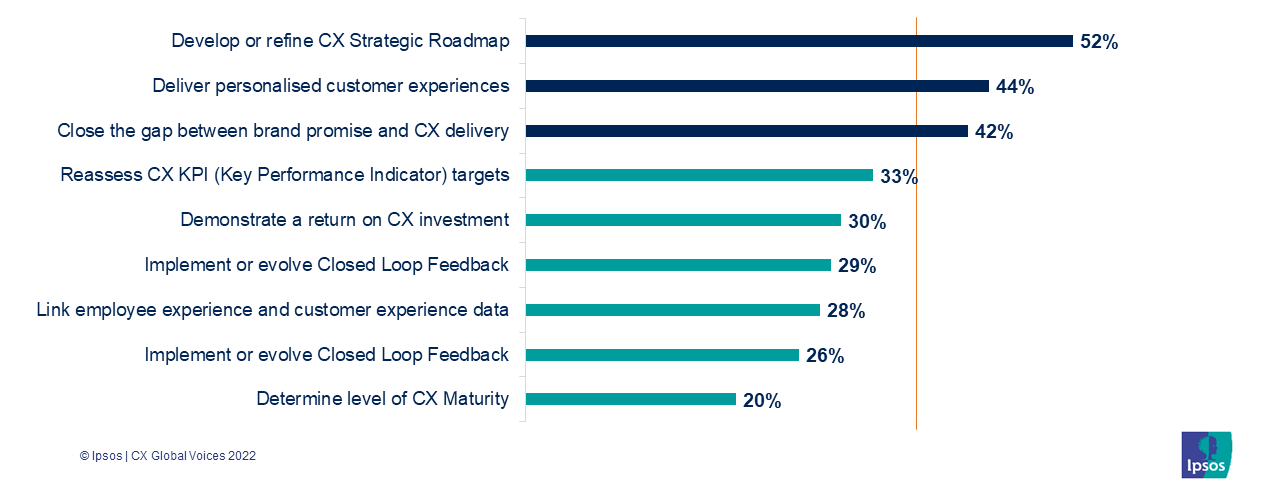Top three priorities for customer experience in APAC for 2023
In the latest CX Global Voices study conducted by Ipsos, customer experience (CX) is found to be gaining further ground on the corporate agenda, but there is still much work to do, and many opportunities that still lie ahead.
Conducted among 1,000 CX professionals across 65 markets worldwide, and 15 different sectors, the study captured global views on the current state of play, what’s changed, organisations’ levels of CX maturity, challenges, and priorities for CX professionals.
In Asia Pacific, the customer experience remains high on the agenda as organisations across geographies and industries agree there is still much work to do. Three priorities have been identified:
- Define a CX strategic road map: The difference between market leaders and the rest when it comes to CX performance is often a road map which lays out the path to delivering on the brand promise, and an increase on the return on CX investments.
- Deliver personalised customer experiences: Most organisations contend with the delivery of personalised customer experiences especially in the face of the complexity of omni-channel customer journeys.
- Close the gap between brand promise and CX delivery: An area that needs more internal alignment for most organisations across all levels of CX maturity.

Defining and delivering on a CX strategic road map
The integration of online and offline experiences will necessitate a change in the company’s customer experience road map. The pandemic accelerated the digital transformation with an expansion of omni-channel experiences which caused customer journeys to evolve, becoming more complex and less linear.
These changes have forced organisations to rethink how they should be managing their customer experience, how it should be delivered, and how it should be measured – a common opinion of CX professionals regardless of their organisation’s CX maturity level.
In defining a CX strategic road map, it is important to ensure the execution of the road map is supported and managed through a CX governance structure. Only 34% of CX professionals can point to such a structure in their organisation, where the CX governance board has the authority to allocate resources to CX activities. Not having a CX governance with clear accountability and authority is one key reason for the weak execution of the road map and the subsequent impact on the business.
An organisation’s CX performance also largely depends on the level of CX maturity. In the Ipsos CX maturity framework, which measures how an organisation excels across six core competencies of customer experience management, only 10% of APAC CX professionals place their organisation as leading, 39% as practising, and the remaining half as foundational.
While the concept of CX maturity is well understood by CX professionals, most organisations do not yet use it as a backbone to their CX strategy and road map. As evidenced by 64% of leaders who have improved their CX performance in the past year, being clear of where, what and how to improve your customer experience competencies does have an impact on how successful your organisation will be at delivering branded experiences.
Personalisation in the face of omni-channel journey challenges
Personalising customer experiences requires an in-depth understanding of customers, which often starts from identifying critical data amid a mass of data from different sources. With the complexity of omni-channel journeys, doing this can be tricky.
But by integrating the right data, organisations can have a more robust understanding of their customers and begin to deliver tangible benefits for both the customer and the organisation, and in a way that positively impacts the brand-customer relationship.
For most of the organisations represented in this study, the lack of fully integrated data is preventing personalisation to develop. Professionals of 21% of organisations in APAC say that their data is still siloed and that there is no integration taking place. For 55% of the organisations, data is integrated on an ad hoc basis with some success. Only 24% have successfully designed data ecosystems that can handle customer information to drive business outcomes.

Closing the gap between the brand promise and CX delivery
The basics of CX delivering on the brand promise has yet to be nailed. Closing the brand-promise gap is high up on the CX professional’s priority list – with four in 10 CX professionals in APAC citing it as being in their top three. And in most markets, increasing numbers are pointing to closing the gap as a priority.
In the study, 32% of APAC CX professionals admitted the experiences their own organisations are delivering to customers are generally worse than promised. From a sector perspective in APAC, for telco, financial services, and automotive, around a third admit to delivering experiences worse than promised.

However, organisations that have voice-of-customer programmes in place, with CX teams managing and acting on critical incidents, are far more likely to be delivering experiences in line or better than promised. When no such customer feedback mechanism is in place, then they are twice as likely to be delivering below par than those that do.
CLICK HERE TO VIEW APAC HIGHLIGHTS INFOGRAPHIC
This article was also featured on Marketing-Interactive. Click here to view



